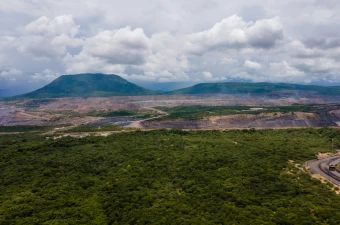Fair Work Monitor reveals violations of workers' rights in mines
Global energy transition is proceeding under extreme high pressure because of climate change and the war in Ukraine. Demand for critical raw materials is skyrocketing. However, miners, an invisible and indispensable group in the energy transition, don’t benefit from the growing economic activity. They’re under enormous pressure in both coal and metal mines. This leads to forced labour, threats and discrimination, according to the new results of CNV Internationaal's Fair Work Monitor. CNV Internationaal calls for just transition partnerships in which governments, companies and trade unions work together with the concrete aim of preventing the energy transition from taking place at the expense of the miners.
No less than 60% of the miners report forced labour. They say they have to work overtime, and half of them don’t even get paid for it. Some 78% say that miners who are union members are threatened and discriminated against and are more likely to get fired, for example. CNV Internationaal calls for miners to be protected according to the sustainability provisions of European trade agreements.
Fair Work Monitor
The pressure on miners working at the beginning of the production chains of raw materials for the energy transition is high and their position is furthermore vulnerable. So says the research report of the first Fair Work Monitor in the mining sector, conducted by CNV Internationaal and Profundo. Participants in the study included coal miners in Colombia as well as metal miners in Bolivia and Peru. Together with local trade unions, questionnaires were drawn up with the topics of interest. Workers can easily and anonymously take part in the survey via their phones or tablets.
The main conclusions of the survey:
- Forced labour
There is forced labour: 60% say they have to work overtime. Of these, 31% of the miners report that they do so because their employer forces them and 32% because they need the money to make ends meet. 33% of the miners say overtime is never paid out. - CBA agreements are not kept
65% of the miners say collective bargaining agreements are not kept, especially paying out promised bonuses or pay rises. - Threats
78% of the miners report that union leaders and members are threatened, discriminated against and oppressed by the companies. Miners are therefore unable to stand up for their rights because union leaders are fired or their contracts are not renewed.
Learn more : CNV Internationaal's First Fair Work Monitor in Mining
Death threats and life-threatening shift work
Trade union work and standing up for better working conditions in the mines is not without danger. In early October, Colombian union leader Dairo Mosquera and his family received death threats if he did not stop his union work. Unfortunately, this is no exception. Trade unions are committed to tackling abuses such as extremely long shifts, known as "turno de la muerte". These so-called death shifts cause safety and health risks. During the very long days, miners report microsleeping while work. Companies don’t respond when unions try to engage in dialogue about decent social plans when mines close (now and in the future) because of the energy transition. However, companies are doing all they can to hold as few permanent workers as possible, which moreover means the unions have fewer members.
Complaint CNV Internationaal with EU
Because of these labour rights violations, CNV Internationaal filed a complaint also on behalf of Latin American miners’ unions with the European Union's complaints mechanism for the first time in April 2022. In coal mining in Colombia and metal mining in Peru, miners' rights are systematically violated.
Temporary work replaces permanent jobs
Contracted jobs are mostly replaced by temporary work. In Peru, it is as high as 80%, although temporary work is officially allowed only for particular specialist work. These temporary workers are discriminated against, they are paid less, their health and safety conditions are worse.
Furthermore, in practice, internationally recognised labour rights such as freedom of organisation and collective bargaining are not respected. Temporary workers who want to organise in a union to stand up for their interests together are threatened and risk being denied a new contract. Mining companies do not accept temporary workers' unions as bargaining parties.
Compliance with sustainability commitments
In the week of 31 October, the European Union will meet in Colombia to consider CNV Internationaal's complaint. Time will tell whether this mechanism does indeed ensure better compliance with sustainability commitments in trade agreements and whether it protects people who are exposed to high risks every day while working in the mines.
Improving implementation
To monitor the sustainable implementation of trade agreements with a focus on labour rights, a so-called Domestic Advisory Group has been set up in both Colombia and the European Union. This is an advisory group of civil society organisations from Europe and the partner country. Both advisory groups will meet from 18-20 October in Colombia.
CNV Internationaal is committed and together with companies and NGOs previously made recommendations to improve the functioning of these advisory groups.
Critical raw materials partnerships
Currently, the European Union concludes critical raw materials partnerships, without it being clear how labour rights are protected in them and whether there is room for civil society to make their voices heard. These standards do apply to trade agreements.
Call for Just Transition Partnerships
The energy transition is in full swing. The battle for scarce resources is raging in all its intensity. The indispensable workers in the mines where the minerals come from remain invisible in that struggle. The transition is at the expense of their labour rights.
That is why CNV Internationaal calls for just transition partnerships in which governments, companies and trade unions work together with the concrete aim of preventing the energy transition from taking place at the expense of the miners.
Publication date 18 10 2023


